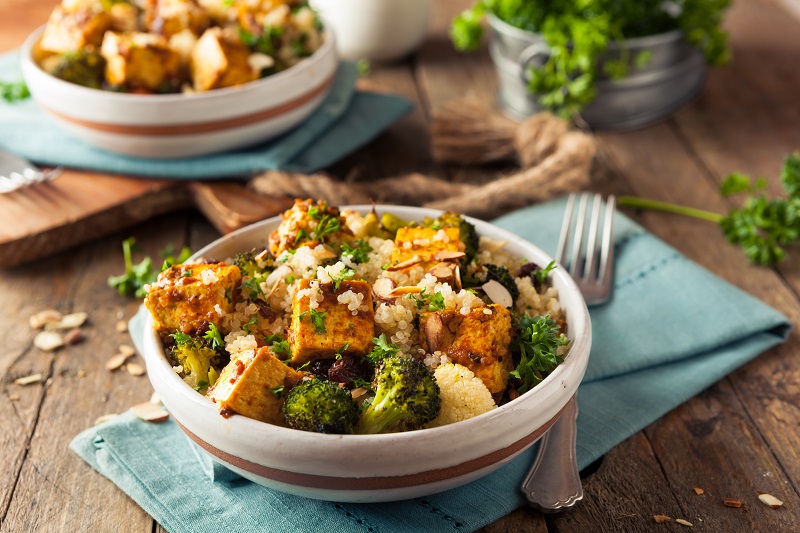The Science of Plant-Based Nutrition
Veganism may seem like a recent fad, but as early as 500BC, people were becoming wise the the benefits of getting their nutrition from plants instead of animals.
Even if you aren’t interested in becoming a vegetarian or vegan, there are a lot of benefits to adopting a diet that focuses on vegetables, fruits, whole grains, legumes, seeds, and nuts instead of meat and dairy.
What Is Plant-based Nutrition?
Many of the diets that we see in the media seem complicated, but following a plant-based diet is surprisingly simple. The basic idea is to get the majority of your calories and nutrients from plants; specifically, you should choose whole foods for the bulk of your eating.
Here are a few basic rules to follow:
- Eat foods that have little or no processing
- Avoid animal-based foods
- Try to eat organic, locally grown foods when possible
Simple, right?
Now, this doesn’t mean that you have to become a vegan to follow a plant-based diet. You can be flexible with your food choices, allowing yourself occasional meals containing meat or dairy. If the majority of your foods are plant-based, you will still reap the rewards of this highly beneficial diet plan.
What are the benefits of a plant-based diet
Many vegans and vegetarians choose to avoid animal products for ethical reasons, but health aficionados are beginning to embrace the positive changes that plant-based nutrition can cause in your body.
So what are these amazing benefits?
It can help you lose weight
One of the most important and staggering benefits of a plant-based diet is the impact that it has on your body weight. Obesity has become a crisis, and eliminating most animal products from your meals is a great way to combat this problem.
According to research, following a plant-based diet is a great way to reduce body weight. In this particular study, participants who ate plant-based foods lost significantly more weight than those who consumed animal products.
It is good for your heart
Having a lower body weight is one of the best ways to reduce your risk of heart disease. However, plant-based diets, in particular, are proven to be a great way to keep your heart healthy. In one study, researchers found that by switching to plant-based foods, participants were able to significantly reduce coronary issues such as high blood pressure and cholesterol.
It’s good for your brain
As we age, it isn’t unusual to notice that our thinking isn’t as sharp as it once was. While this is a normal part of ageing, there are ways to reduce the impact of old age on your brain. A review of several different research studies determined that people whose diets focus on fruits and vegetables were able to reduce their cognitive decline by around 20% as they aged.
It can be good for your vision
The key to keeping your eyes strong and healthy throughout your lifetime lies with the vitamins and minerals in the foods that you eat. Vegetables and fruits such as carrots, kale, corn, and kiwi are loaded with vitamin A, lutein, and zeaxanthin, which prevent your vision from degenerating over time. Keeping your diet focused on plant-based foods ensures that you get more of these beneficial nutrients.
It helps your digestion
Plant-based foods are naturally packed with fiber. Including more fiber in your diet is a great way to keep your digestive health in peak condition. Fiber is also an important component to lower cholesterol and blood sugar. A plant-based diet will ensure that you get plenty of fiber in your meals.
It can keep your skin looking great
Skin care isn’t all about what you put on your body. The foundation for great skin is actually based on the foods that you put into your body. Fruits and vegetables such as tomatoes, sweet potatoes, and spinach are loaded with lycopene, vitamin C, and folate, which are essential for young, glowing, healthy skin. This means that a plant-based diet is a skin-healthy diet.
What foods can you eat?

- fruits such as berries, citrus, and pears
- vegetables such as leafy greens, broccoli, and carrots
- starchy vegetables
- whole grains such as brown rice and whole-wheat bread
- plant-based protein such as tofu and tempeh
- seeds and nuts such as almonds, cashews, and sunflower seeds
- legumes such as peanuts and chickpeas
- healthy fats such as avocadoes, coconut oil, and olive oil
If you choose to add occasional meats to your meals, focus on organic, non-processed foods. Avoid meats like deli meat and bacon. Fish and lean chicken are some of the healthiest options.
Tip: why not try some of our recipes? Not all are vegan or vegetarian-friendly, but the majority are.
What foods should you avoid?
While this diet focuses mainly on avoiding animal-based products such as meat, dairy, and eggs, the quality of the food that you eat is also important. Here are some foods that you should keep off your plate.
- fast food
- foods with added sugar
- processed vegan meat and dairy substitutes
- refined grains
The bottom line is that less processing equals more nutrition!
Is plant-based nutrition right for you?

You can start by reducing the amount of meat that you eat and adding in more fruits and vegetables. You can also make some small substitutions to your meals to make them less processed, such as switching from white rice to brown.
One important consideration for anyone contemplating a plant-based diet is protein intake. People tend to get a lot of their daily protein from animal-based products.
However, there are plenty of plant-based products that provide a healthy punch of protein. Soy, nuts, and legumes are all great options for plant-based protein. Most people can get sufficient protein while following a plant-based diet if they are careful about their food choices; however, people with certain health problems, such as iron deficiencies, may find it more difficult.
Another concern with any diet is making sure that you get all of the vitamins and minerals that you need. If you give up dairy, you may find it more difficult to get an adequate supply of calcium and vitamin D. Older women, in particular, can face serious health problems if they lack these nutrients. However, alternatives such as almond milk, leafy greens, and mushrooms can help make up for the nutrients you aren’t getting.
As with any diet plan, the key to a plant-based lifestyle is balance and careful planning. If you focus on quality, whole foods in the appropriate balances, a plant-based diet can do wonderful things for your health.










